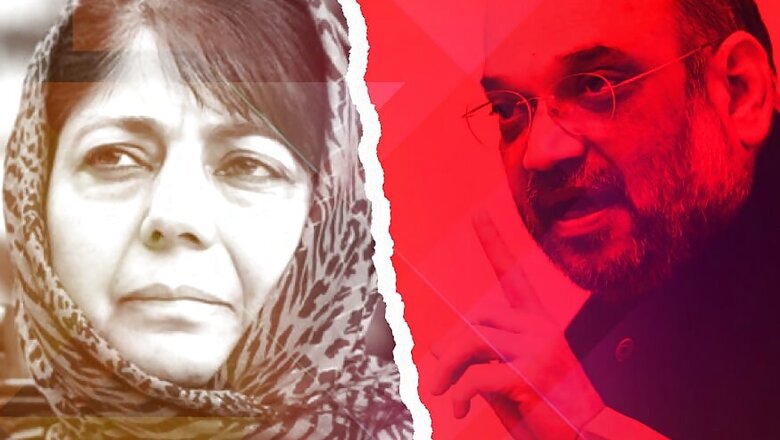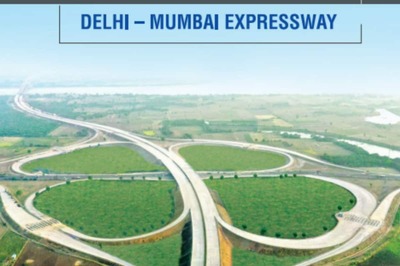
views
New Delhi: In a very ominous tone, former CM of Jammu and Kashmir and PDP chief Mehbooba Mufti on Friday morning claimed that attempts to breakup her party and stitch-up an alliance will create a new wave of militancy.
“If Delhi tries to dismiss the voting rights of people like in 1987, if it tries to create divisions and interfere like that, then I think just like a Salahuddin and a Yasin Malik were born in 1987...if it tries to break PDP like that then outcomes will be dangerous," Mufti told reporters in Srinagar.
Her political rival, and former Chief Minister Omar Abdullah took a strong exception to Mufti’s message and issued a couple of tweets: “She must really be desperate if she is threatening the Centre with renewed militancy if PDP breaks up. She seems to have forgotten that militancy in Kashmir has already been reborn under her most able administration." And adding in bold letters, in the following tweet, that not one new militant will be created with the break-up of the PDP. “People will not mourn the demise of a party created in Delhi only to divide the votes of Kashmiris."
Mehbooba has been trying to hold on to her MLAs ever since rumours started floating of BJP trying to engineer mass defections in PDP, which were confirmed when on July 1 influential Shia cleric Imran Raza Ansari first spoke out against her party chief.
PDP rebels, some of who claim their strength to be over 15, have publicly given Mehbooba Mufti two options: either resign and handover the chief’s chair or be ready for a split. Despite having held one-on-one meetings with some of these rebels and apologising for the nepotism she introduced into the party, including inducting her unelected brother into the council of ministers, Mehbooba has been watching her grip slacken as MLAs slip to the other camp one after the other.
A number of meetings have been held between leaders of the BJP, Sajad Lone headed People’s Conference, and PDP rebels. The first significant meeting in this regard was held between Ram Madhav, the party in-charge of the state, who was accompanied by state BJP leaders, at Sajad Lone’s house. The meeting was held barely 10 days after BJP pulled out of the government it was running in coalition with PDP. Since then Lone, Nirmal Singh and Ravinder Raina have visited Delhi and Ram Madhav has made multiple visits to the valley.
Sources in both PDP’s rebel camp as well as in BJP have talked about an imminent announcement likely to be made right after the Amarnath Yatra, which ends on August 26.
Yaseen Malik, Salahuddin and the 1987 Reference
There is a growing feeling within the party leaders close to Mehbooba that “New Delhi can do what it wants, as history tells us". The sentiment among the core PDP group is that BJP is trying to replicate what Congress, while being at the centre, did in J&K in 1987.
It is widely believed that the Assembly elections of 1987 in J&K were rigged, which was one of the big factors of mainstreaming militancy in Kashmir. Some claim the rigged ‘87 elections to be a watershed moment in the history of the state.
Many people from the time have described how blatantly were the 1987 Assembly elections rigged in an attempt to prevent an orthodox Islamic party - the Jamaat-e-Islami backed Muslim United Front (MUF) - from getting into mainstream politics and becoming a political rival of National Conference’s Farooq Abdullah, the then Chief Minister, backed by Congress at the centre led by Rajiv Gandhi, the then Prime Minister.
One of the MUF leaders was a Jamaat-e-Islami preacher, who was known for his affecting oratory - Muhammad Yusuf Shah. He fought elections from Amirakadal constituency and lost. Shah would three years later, in November 1991, nearly six months after it was founded, take over as the chief of Hizbul Mujahideen and give himself the nom de guerre - Syed Salahuddin. His polling agent was Yaseen Malik who later went on to, with his associates, found Jammu and Kashmir Liberation Front (JKLF).
These allegedly rigged elections also gave rise to people like Ashfaq Majeed, Hamid Sheikh, Ahsan Dar, among others, who were the very first Kashmiris to cross over to Pakistan for arms training.
In his book ‘Kashmir: Glimpses of History and the Story of Struggle’, Saifuddin Soz, singularly blames Farooq Abdullah’s hunger for power behind the rigging, which he says gave rise to the wave of militancy.
‘The most important question often raised was, though the militancy was a sponsored situation, how did the Kashmiri youth get attracted to it and willingly agree to receive training in arms in Pakistan-held Kashmir?
“The most plausible argument accepted was the rigging in J&K legislative assembly polls of 1987 that led to a huge unrest among the youth. The MUF had many followers in some segments of Kashmir that could give it a noticeable position in the Assembly. They could have won at least 10 to 12 seats...Unfortunately, New Delhi’s power elite, backed by intelligence agencies and Dr Farooq Abdullah became restive...Dr Abdullah had once remarked, perhaps in lighter vein, “We have to retain power at any cost as we have to serve the people. I am not going to sit in the Opposition,"’ writes Soz.
Several political observers have accepted that the ‘87 elections were a large scale fraud, former chief of R&AW, and the Kashmir advisor to Prime Minister AB Vajpayee, AS Dulat is among them.
In his book ‘Kashmir: The Vajpayee Years’ Dulat writes: “Most of the boys who first crossed over into Pakistan for terrorism-training under the ISI, following the fraudulent assembly elections in 1987 in which many of them were involved as poll agents for the new opposition party, the Muslim United Front (most of whose leaders would six years later form the separatist All Parties Hurriyat Conference), did so under the aegis of the JKLF.’"
















Comments
0 comment